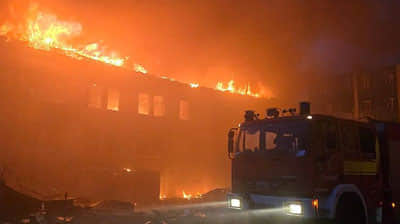It will take dozens of years to restore Ukraine’s natural environment after hostilities – ecologists
Yana Osadcha, Ukrainska Pravda.Zhyttia — WEDNESDAY, 27 JULY 2022
It will take decades for Ukraine’s natural environment to recover from the war, according to Czech and Ukrainian ecologists, the Czech publication Blesk reported.
"Different ecosystems have different recovery times; for example, it will take 50 years to restore the primaeval steppe in nature protection areas in the south of Ukraine," said Marcela Černochová, programme coordinator of the "Ukraine" project of the environmental organisation "Arnica".
She pointed out that some ecosystems and the populations of some animals and plants have been so devastated that we may lose them forever.
"For example, important migratory routes of a number of bird species pass through Ukraine," Černochová noted.
The expert says that the catastrophe increases with each additional explosion, as well as due to unexploded ammunition, mines or pieces of military equipment. "According to estimates, this already amounts to 214,000 tonnes of scrap metal," said Černochová.

The movement of heavy military equipment and shelling that causes fires are of greatest concern. They lead to huge problems at the local and regional levels, especially in the south and east of the country.
The situation is particularly difficult in Donbas, where oil refineries and warehouses often come under fire.
"Thus, explosions, fires or flooding of the affected areas pollute the water, air and soil with dangerous substances that can remain in the environment for decades," said Lukáš Hrábek, press secretary of Greenpeace Czech Republic.
According to the Ukrainian ecologist Oleksii Anhurets, several attacks on industrial facilities and resulting leakage of dangerous substances have been recorded in the areas of Sievierodonetsk and Kharkiv. He says that the estimated emission of pollutants as a result of the bombing and shelling of oil storage facilities since the beginning of the war has already exceeded 290,000 tonnes: normally, this volume of pollutants is emitted by a large metallurgical plant in a year and a half.
At the same time, the problem of air pollution is not limited to Ukraine - it can also "travel" to neighbouring countries.
"It depends on the type of pollution, the direction and speed of the wind," Černochová explained.
Soil pollution is also a serious problem. In addition to the fire, an exploded grenade or projectile will cover the site and the surrounding area with heavy metals. Yet they are the only way the soil is poisoned. For example, a fuel leak from a hit or moving military equipment contaminates it with petroleum products.
"In the future, all toxic substances in the soil could get either directly into food or into the food chain," Černochová said.
Ukrainian agriculture and farmers face another danger: in many places it is impossible to farm or harvest grain due to the security situation and unexploded mines and ammunition.
"Ukraine is known as the breadbasket of the world, so the war will have a very painful effect on some poorer countries, where there is a real threat of famine," she added.
Ukrainian environmental and air quality monitoring experts Maksym Soroka and Oleksii Anhurets are part of the team that is preparing the methodology for assessing and calculating damage from the Russian invasion.
However, according to Maksym Soroka, it is important not to classify crimes against the environment into some special category, because they are "also crimes against humanity."
He considers it part of the genocide of the Ukrainian people.
"The Ukrainian environment and nature are being deliberately destroyed with the aim of harming people, destroying their homes and making it impossible to live in their country," he says.






